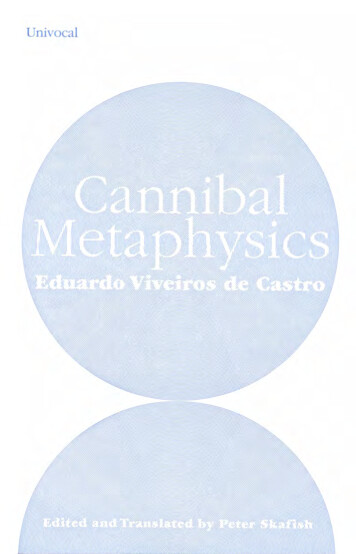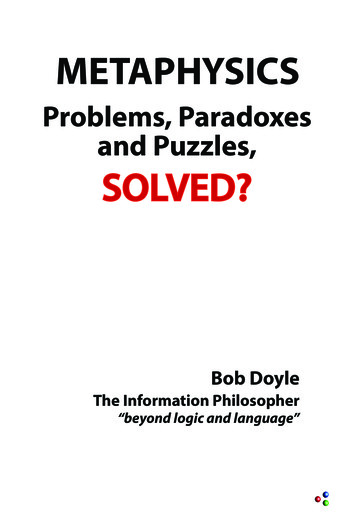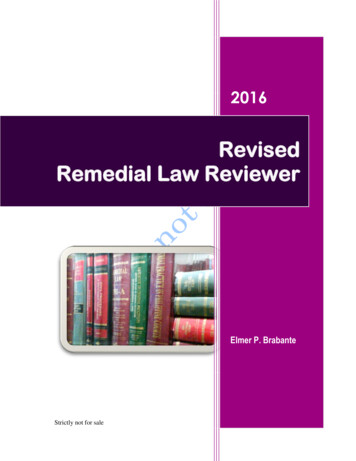
Transcription
CANNIBAL METAPHYSICSFOR A POST-STRUCTURAL ANTHROPOLOGYEDUARDO VIVEIROS DE CASTROtranslated and edited by Peter Skajish
Metaphysiques cannibalesby Eduardo Viveiros de Casrro Presses Universiraires de France, 2009Translared by Perer Skafishas Cannibal MetaphysicsFirsr EditionMinneapolis 20 1 4, Univocal PublishingPublished by Univocal1 23 Norrh 3rd Streer, #202Minneapolis, MN 55401No part of rhis book may be reproduced or rransmirred in any formor by any means, elecrronic or mechanical, including photocopying,recording or any other information storage or retrieval system,without prior permission in writing from the publisher.Designed & Printed by Jason WagnerDistributed by the Universiry of Minnesota PressISBN 978 1 93756 1 2 1 5Library o f Congress Control Number 201 4952937
AcknowledgmentsThe argument of this book has been nourished by research pre sented in the following publications that have since been adapt ed, revised, and considerably re-worked and developed during thecourse of the book's editorial revisions.1 . "Perspectivismo e multinaturalismo na America idigena," inE. Viveiros de Castro, A inconscancia da alma selvage, Sao Paulo,CosacNaify, 2002 (p. 347-399) .2. "And," Manchester Papers in Social Anthropology, 7, 2003.3. "Perspectival anthropology and the method of controlled equivo cation," Tipiti (Journal of the Society for the Anthropology of low land South America) , 2 ( 1 ) , 2004, p. 3-22.4. "Filiayfo intensiva e alianya demoniaca," Novos Escudos Cebrap,77, 2007, p. 9 1 - 1 26.5 . "Xamanismo transversal: Levi-Strauss e a cosmopolftica amazoni ca'' in R. Caixeta de Queiroz and R. Freire Nobre, Levi-Strauss: lei turas brasileiras, Belo Horizonte, Editora UFMG, 2008 (p. 79- 1 24)Numerous people have contributed to the realization of thesewritings. Most of them appear in the bibliography of this pres ent work. Nevertheless, I would like to mention the names ofTania Stolze Lima, Marcio Goldman, Oiara Bonilla, Martin Hol braad, Peter Gow, Deborah Danowski, Marilyn Strathern, BrunoLatour, Marshall Sahlins, Casper Jensen, Philippe Descola andAnne-Christine Taylor, who should be thanked for having, each
in their own way, caused, inspired, supported, translated, cri tiqued, or in one way or another, improved the ideas put forwardin this book.A first version of this book was presented for the occasion of aseries of conferences that took place at 1.:Institut d' etudes avanceesde Paris (Maison Suger) in January 2009. I want to thank YvesDuroux and Claude Imbert for their generous invitation, thewarm welcome, and the stimulating work environment they pro cured for me during those winter weeks. Last, but certainly notleast, I would like to thank Patrice Maniglier who made this bookpossible by inviting me to take it on as a project and for providingthe ideal context in which to publish it as well as for (literally!)making me write it. But more than anything else, I owe him grat itude for his own writings whose themes are quite close to mineand which inspired me to write this book simply by the fact thatI had learned something new.
Table of Contentslntroductionby Peter Ska.fish.9PART ONEAnti-Narcissus1 . A Remarkable Reversal. .2. Perspectivism3. Multinaturalism4. Images of Savage Thought39496577. . . .PART TWOCapitalism and Schizophreniafrom an Anthropological Point of View5. A Curious Chiasm . . . . . . . . . . . . . . . . . . . . . . . . . . . . . . . . . . . . . . . . . . . . . . . . . . . . . . . . . . . . . . . . . . . . . . . . . 976. An Anti-Sociology of Multiplicities1 077. Everything is Production: Intensive Filiation1 23.PART THREEDemonic Alliance8. The Metaphysics of Predation1399. Transversal Shamanism .15110. Production Is Not Everything: Becomings1 591 1 . The System's Intensive Conditions . . . . . . . . . . . . . . . . . . . . . . . . . . . . . . . . . . . . . . . . . . . . . 1 73. . .
PART FOURThe Cannibal Cogito1 2. The Enemy in the Concept1 871 3. Becomings of Structuralism . . . . . . . . . . . . . . . . . . . . . . . . . . . . . . . . . . . . . . . . . . . . . . . . . . . . . . . 1 97.Bibliography.22 1
IntroductionCan anthropology be philosophy? Can it not just contribute tobut do, and even aid in reinventing philosophy, in the sense ofconstructive, speculative metaphysics? And what, in that event,would philosophy be, since most of its best instances begin, endwith, and never abandon Western categories? Such questionsmight be lamely disciplinary were it not for the symmetricallyunimaginative, joint response they still receive. For the philoso phers, things are often quite simple: anthropology is a source ofempirical specifications or exemplifications of matters conceivedmore universally by themselves, but only rarely does it accede tosuch a broad level of reflection. The anthropologists, surprisingly,do not exactly balk at the put-down, the large part of them onaccount of a commitment to examining "reality" in its singularityand particularity (which is to say, out of not just a concern withthe concrete but the presumption that intellectual and ethical re sponsibility is incompatible with posing big questions) and its"theoretical" wing out of recognition that few people claimingthe mantle of philosophy prove sufficiently adept at critique tonot end up treating modern liberal ideological values as profoundtruths, or misconstruing the most simple actualities in their re flections on them.Although both views might have once characterized actual ly existing research, too much has happened since to leave themperspicacious, and what has been called the "theoretical bomb"of Eduardo Viveiros de Castro's Cannibal Metaphysics will likelyleave them a complete shambles. 1 Leaving aside the fact that aI. The characterization is Latour's. See his "Perspectivism: Type or Bomb," AnthropologyToday, guest editorial, April 2009, vol. 2 5 , no. 2, pp. 2 1 -22. which summarizes the public9
figure as imposing as Bruno Latour never gave up on doing con structive philosophy (whether as "intraphysics" or the more recent"empirical metaphysics") , the engagements of anthropologistswith Islamic political theology, thinking forests, and the modesof truth operant in divination practices, along with the displace ment of Western philosophical categories by a nonanthropologistoften outdoing on this point the anthropologists-Frarn;:ois Jul lien-alone upset the received picture of an anthropology speak ing concrete truth to a high-flying philosophy congenitally deafto it. Yet if anthropology and even philosophy indeed no longermatch those images, then the rather huge problem opens up ofhow both can be done together (and what the thing itself then is)without lapsing back into familiar philosophical starting pointsor the merely critical, nonconstructive position anthropology ismost often comfortable with. The question is what the philos ophy of this anthropology will be if philosophy is indeed beingtransformed by the latter, and Cannibal Metaphysics is, well pastwhat even an attentive reading might point to, indispensable toanswering it; to defining, that is, the problems, terms, methods,political situation, and intellectual disposition of a thinking nolonger complacently satisfied with neglecting concepts externalto the West and thereby conceptually mimicking the moderns'violent absorption of other peoples, by presuming that such ideascan always be reduced back to their own. To invent the condi tions for a thought cognizant, as Viveiros de Castro puts it, of thetheoretical imaginations of all peoples, and to thereby contributeto the "permanent decolonization of thought," the cannibal mul tinatural, and perspectivist version of which we will meet below.But before we get there, some introductions. First published ina French series, entitled "MetaphysiqueS," devoted to novel de velopments in contemporary philosophy, Viveiros de Castro'sbook is perhaps the first attempt by a "real" anthropologist atdoing speculative philosophy on the basis of ethnographic mate rials, and to lay out how anthropology has perhaps already beendebate held between Viveiros de Castro and Philippe Descola in Paris shortly after thepublication of Mitaphysiques Cannibales.10
doing this for a long time.2 (And actual philosophers apparentlyagree: the series' editors are a coterie of former normaliens that in cludes Quentin Meillassoux and Patrice Maniglier, and RaymondRuyer, Etienne Souriau, and Graham Harman count among itsauthors.) A Jesuit-educated native of Rio and virtuoso of cari oca irony whose research concerned the Arawete of the easternAmazon, Viveiros de Castro first became known outside hiscountry in Paris, where his attempt to extend the structuralismof Claude Levi-Strauss garnered him the attention of this masterof anthropology, drew him soon after into debate with one of itschief inheritors (Frans;oise Hfritier) , and brought him into con tact with another Amazonianist proponent of structuralism fromhis generation, Philippe Descola, with whom he would maintaina lifelong friendship characterized as much by striking intellectualaffinities as by strained theoretical disagreements (their story iscentral to understanding this book) . But Viveiros de Castro wasonly structuralist or Levi-Straussian in a very particular, which isto say Deleuzian, sense and the work for which he would becomeknown in anthropology would be most widely received, as hasmost often been the case with the inheritors of French theory,outside France. The concepts his name has become synonymouswith-Amerindian perspectivism and multinaturalism-weregiven their initial formulation in lectures Viveiros de Castro deliv ered in Cambridge at the invitation of Marilyn Strathern (his the oretical "impossible twin" in the sense he develops here) , wherethey would influence the generation of European, British-educat ed anthropologists most identified with the discipline's broader"ontological turn."32. Paul Rabinow is the other one, if Latour is in a category of his own. Yet Anthropos To day: Reflections on Modern Equipment (Princeton: Princeton University Press, 2003) is asanti-philosophical as philosophical (in favor of casuistry over ontology, and pluralistic formoderns alone) and certainly not speculative or metaphysical. Consider Cannibal Meta physics its opposite number.3. This term, which is owed to Marcin Holbraad, has been used to indicate a tendency inanthropology not toward continental philosophy {in fact, most of its practitioners avoidchat) but to work that presumes chat the collapse of the nacure/ cul cure distinction neces sitates conceiving comparisons as groundless and thus recursively impaccful on our ideas;the turn is most often associated with Holbraad, Moreen Pedersen, Casper Bruun Jensen,and their former mentors, Scrachern and Viveiros de Castro. It should at the same time benoted that Viveiros de Castro has exercised a decisive influence on a number of inventiveanthropologists who are not entirely pare of the turn, including Pierre Deleage, RupertScasch, and Eduardo Kohn (who has stated that his entire theoretical work began as an11
The basic idea was that Amazonian and other Amerindianpeoples (from the Achuar and the Runa all the way up to theKwakiutl) who live in intense proximity and interrelatedness withother animal and plant species, see these nonhumans not as otherspecies belonging to nature but as PERSONS, human persons infact, who are distinct from "human" humans not from lackingconsciousness, language, and culture-these they have abundant ly-but because their bodies are different, and endow them witha specific subjective-"cultural" perspective. In effect, nonhumansregard themselves as humans, and view both "human" humansand other nonhumans as animals, either predator or prey, sincepredation is the basic mode of relation. Thus the idea that cultureis universal to human beings and distinguishes them from the restof nature falls apart, as we are faced here with what Descola oncecalled "the society of nature," a collective in which humans, an imals, plants, and even minerals, tools, and astronomical bodiesare all agents, and where all of (human) human life, from kin ship to politics to medicine, is arranged and conducted accord ingly. Most crucially, the dizzying preponderance of perspectiveson the self entails that the other is effectively ontologically prior,and subjectivation requires assuming, through shamanism andother translational means, the perspective of another. Self-con sciousness is reached not through confrontation with the otherand subsequent self-return but through temporarily occupying,as dramatized by the Tupian cannibalistic sacrificial rituals thatthis book's title references, the enemy's point of view, and seeing"oneself" from there.4What in this rendering of "perspectivism" resonated with thisgeneration of anthropologists was that Viveiros de Castro treatedthe suppositions of Amerindian cosmology not only as demand ing a critique of ostensibly universal Western concepts but alsoas a possible and actual basis for our own thinking, and thus tooas the products of people(s) who ought to be acknowledged ashaving a status equal to that of practitioners of modern science.attempt to specify the practical
of Eduardo Viveiros de Castro's Ca nnibal Metaphysics will likely leave them a complete shambles. 1 Leaving aside the fact that a I. The characterization is Latour's. See his "Perspectivism: Ty pe or Bomb," Anthropology Today, guest editorial, April 2009, vol. 25, no. 2, pp. 21-22. which summarizes the public 9 . figure as imposing as Bruno Latour never gave up on doing con structive .











